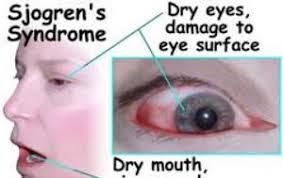Sjögren syndrome is an inflammatory disease that affects primarily the salivary and lacrimal glands, causing dryness of mouth and eyes.
Cause:
The disease is believed to be caused by an autoimmune T cell reaction against one or more unknown self antigens expressed in these glands,or immune reactions against the antigen of a virus that infects the tissues.
Symptoms:
The two main symptoms of Sjogren’s syndrome are:
- Dry eyes. Your eyes might burn, itch or feel gritty — as if there’s sand in them.
- Dry mouth. Your mouth might feel like it’s full of cotton, making it difficult to swallow or speak.
Some people with Sjogren’s syndrome also have one or more of the following:
- Joint pain, swelling and stiffness
- Swollen salivary glands — particularly the set located behind your jaw and in front of your ears
- Skin rashes or dry skin
- Vaginal dryness
- Persistent dry cough
- Prolonged fatigue
Risk factors:
Sjogren’s syndrome typically occurs in people with one or more known risk factors, including:
- Age. Sjogren’s syndrome is usually diagnosed in people older than 40.
- Sex. Women are much more likely to have Sjogren’s syndrome.
- Rheumatic disease. It’s common for people who have Sjogren’s syndrome to also have a rheumatic disease — such as rheumatoid arthritis or lupus.






